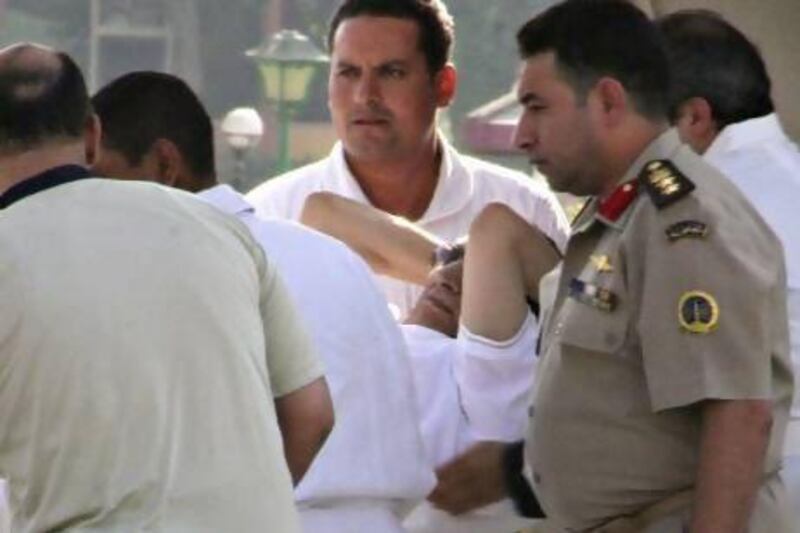CAIRO // Deposed autocrat Hosni Mubarak was flown out of prison yesterday by helicopter, freed after more than two years in jail, with no convictions against him.
Under a state of emergency declared by the military-backed government more than a week ago, Mr Mubarak, who ruled Egypt for more than three decades, will be placed under house arrest. The trials against him, including one of complicity in the killing of demonstrators against his rule in 2011, proceed.
Officials told Reuters that the ailing 85-year-old was flown to a military hospital in the upscale neighbourhood of Maadi.
A panel of judges conducting a hearing inside the prison on Wednesday had concluded that there was no longer any grounds to hold the former leader who millions of Egyptians poured into the streets to oust more than two years ago.
The prosecution did not appeal the decision.
Although the hearings to determine the release had been scheduled for weeks, the timing still resonated deeply with Egyptians, who have seen a deeply flawed, but democratically elected, Islamist government kicked out by the army on July 3. The resulting Islamist demonstrations were crushed, resulting in bloodshed of protesters and police, and outbreaks of sectarian violence nationwide.
The country is now ruled by a military-backed group of unelected officials.
But in a city shell-shocked by weeks of violence at levels never seen before in the capital, the news was greeted with muted anger by some and subdued happiness by others.
On the forlorn traffic island in the centre of Tahrir Square - which sizzled with fireworks and thronged with people in February 2011 when the world's eyes turned to it - only a few ragged tents remain.
Some of the people napping in them to escape the ferocious sun appeared to be homeless. Others recalled the heady feeling of power when they kicked out their president, but, chastened by the subsequent chaos, welcomed his release from jail.
"We did demonstrate against him," said Mohamed Al Sayed, 23, unemployed and with three children. "But after we found out the Muslim Brotherhood were worse, he's definitely the better option."
He even hopes that Mubarak will become president again. "He knows everything about Egypt," he said. "He knows the ins and outs."
His friend, Ahmed Al Sayed, was more ambivalent. "Personally when I saw Al Masry Al Youm newspaper this morning, with Mubarak on the front, looking happy and smiling, I felt disappointed and betrayed," he said.
Others were more forceful.
"The January 25 revolution's main goal was that he'd never come back to politics and never be in power again," said Adel Abu Shady, referring to the beginning of the tumultuous 2011 uprising.
"The feloul [old regime remnants] are playing with us, playing with our emotions - we can't let this happen so easily," said the 55-year-old hardware store owner.
Amid the shrinking number of Egyptians condemning both the old regime, the excesses of the Brotherhood-led rule that followed it and the military crackdown, activist Wael Abbas is bitterly disappointed at the prospect of Mr Mubarak being freed.
"I think it's now obvious what was intended from the beginning," he said. "What was intended from the military coup what was intended to please the businessmen who run this country and the military junta which is also a business institution."
He said that he had been expecting the release for some time. Four cases had been levelled against the one-time president, and the permitted period of detention without conviction had elapsed in each case.
He accused the judiciary of being deeply corrupt, and criticised the way in which the trials were carried out. The Egyptian Initiative for Personal Rights, which has monitored the cases, said that security agencies destroyed evidence which would have been used in the trials.
"This is the end of the revolution," said Mr Abbas.
afordham@thenational.ae
twitter: For breaking news from the Gulf, the Middle East and around the globe follow The National World. Follow us





